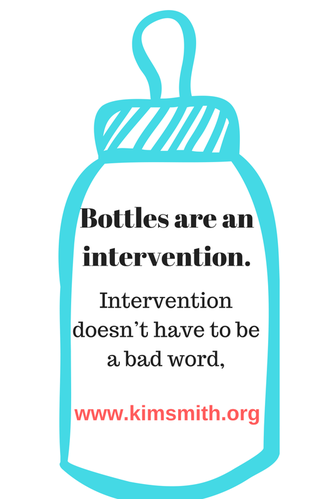 Yes, I am a lactation consultant and yes, I am telling you that you can, and sometimes should, use a bottle to supplement your baby. The trick is knowing when that is appropriate, knowing what the feeding issues are that require supplementing and a plan to addressing the feeding issues. Bottom line is babies need to be fed. That is the first rule. If a baby is struggling to feed at the breast, we have to feed them in an alternative manner. Believe it or not, hungry babies are not demanding babies. This is why we weigh babies and ask about pees and poops and mood, etc. We cannot trust a sleeping baby is a happy baby or that a hungry baby will cry. Babies that are failing to thrive are often the seemingly the most content, “easy”, passive babies. A quiet baby often concerns me more than the one with strong lungs demanding more attention. Supplementing in the first few hours and maybe even the first couple days can be done easily with a syringe, finger feeding or a cup. But as babies get older and supplementation either needs to be introduced or continued, the volume of breastmilk needed goes from a few drops to a couple ounces at each feed, and many parents need something faster, less finicky and overall more convenient to use. That sounds like a bottle to me! I know, I know. We shouldn't introduce bottles and nipples or formula for 4-6 weeks while we get breastfeeding established, right? ALL the books say so! So I mustn’t have a clue what I am talking about. Yes, those “rules” are sufficient if there are no feeding concerns. Rules are made to be broken and when we have feeding issues and concerns, we need to break some rules to get resolution. In fact, we are not really breaking any rules, since those rules are written for the average breastfeed baby, with no feeding issues. The babies I am talking about are babies with feeding issues, concerns about intake and weight and have a need for supplementation. You might be saying, OK, but what about a Supplementing Nursing System (SNS). An SNS might be an option, but again most parents report they are finicky and hard to learn about. The other concerns are they are expensive, hard to buy locally. I would also add in that with a plan to resolve feeding issues, supplementing would be short term and a bottle wouldn’t be used long, so easier to access and cheaper to buy. The SNS also wont help supply if baby is not feeding effectively. A SNS is a great option for long term supplementation needs that some mothers experience with conditions like Insufficient Glandular Tissue. This is a less common breastfeeding issue than what I am discussing in this post. The sorts of breast-feeding issues I am talking about are babies with no, slow or low weight gain, tongue ties, birth injuries, post birth feeding delays, secondary low milk supply and sometimes a combination of these concerns. What is vital to understand is that a baby that is slowing gaining, holding weight but not gaining or is losing weight cannot effectively feed themselves. They will spend hours at the breast. Mothers report feeding for 5-6 hours straight & cannot understand how with all the feeding babies are doing they are now gaining adequately. The answer is to this plainly and body simple. They are not feeding, they are pacifying themselves. With this their appetite delays or diminishes and they never demand to be feed. They are content to nurse when placed at the breast, they will swallow with let downs or breast compressions but they are unable to stimulate more let downs and cannot extract milk from the breast. As this happens the mothers supply will decrease and the cycle gets vicious. With a decrease in supply, there is a decrease in let downs that just simply occur and babies get even less milk. The feeding becomes all mother driven. By giving these babies bottles (breastmilk or formula depending on the situation) , getting the volume they need into their bodies, their weight increases, their appetite increases, their desire to feed increases and then moms supply increases in response to the baby. I would say any of these situations should have a skilled lactation consultant involved to know the amount of supplement needed, now often and for how long. Depending on the reason for the initial feeding, there might need to be more of a plan in place to then decrease the amount of bottle feeding, but that also needs to be addressed with skilled lactation care. If the initial reason is left unresolved then taking away the bottles will just result in more concerns. Bottom line is, sometimes bottles will be what saves breastfeeding. Yes, bottles are an intervention, but intervention doesn’t have to be a bad word. |
Kim Smith
|
 RSS Feed
RSS Feed
